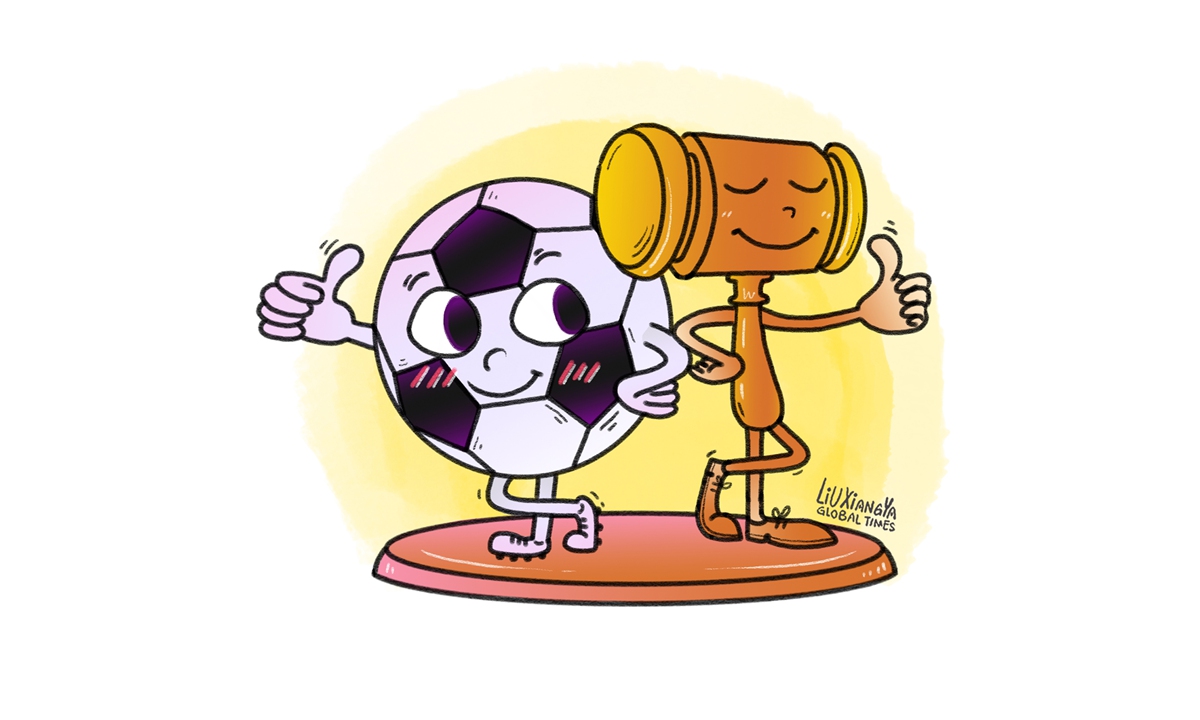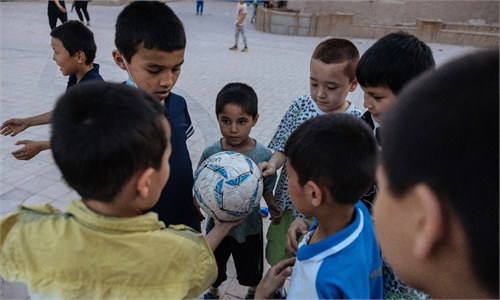ARTS / CULTURE & LEISURE
Unprecedented anti-graft campaigns safeguard revitalization of Chinese soccer

Illustration: Liu Xiangya/Global Times
The latest development in China's anti-corruption campaign in soccer has seen several players and a coach from the Chinese Super League (CSL) giants Shandong Taishan placed under investigation.
South Korean soccer player Son Jun-ho led the latest high-profile case as he was detained on suspicion of accepting bribes from non-state employees. It is worth noting that Son is the first foreign player to be investigated and detained over soccer-related allegations in China's soccer history.
Though there have been no official announcement on the whereabouts of Hao Wei, the former head coach of Shandong Luneng, it is reported he is also under investigation. Hao has not shown up at any Shandong team games since the second round of the league when Shandong took on Nantong Zhiyun on April 21. Shandong's assistant coach Fabio Lefundes of Brazil had to be the caretaker of the team.
Shandong, however, announced last week that they've penned a contract with South Korean soccer coach Choi Kang-hee. The team won last season's Chinese Football Association Cup championship but now sit at a mediocre 11th place in the 16-team top flight.
Some people believed that after the resume of the CSL in mid-April, those who were involved in corruption cases would not be investigated as everything had returned to "normal," but the recent cases have underlined that anyone who has violated laws and regulations have to face the consequences.
China's sports chief Gao Zhidan on Friday called on all sports officials to learn from the lessons of the past. Since the anti-corruption campaigns in soccer started in November 2022, more than 10 senior soccer-related officials have been detained or investigated over legal and disciplinary violations, including Du Zhaocai, a deputy minister of the General Administration of Sport, and Chen Xuyuan, president of the Chinese Football Association.
In 2015, China adopted a national plan for the reform and development of the sport, which stipulates a "short-term goal" that includes straightening out the soccer management system, while the "medium-term goals" are to achieve a substantial increase in the youth soccer population, to achieve first-class professional league organization and competition levels in Asia, and to rank the national men's soccer team at the forefront of Asia.
However, eight years have passed, and the sport is still far away from the above mentioned goals despite years of high-roller investment in soccer, which fueled the resurgence of corruption cases. The past decade has witnessed dozens of world-level soccer stars come play in the CSL, but their stints have not lasted long since the money-splashing clubs have been financially unstable.
The country experienced a round of scandals in 2009, with high-profile match-fixing cases that ended with all former vice presidents of the Chinese Football Association being arrested and removed from their posts. Some high-profile players such as Shen Si and Qi Hong, both former China internationals, were sentenced for the same charges South Korean player Son has been arrested for.
The anti-corruption storm in 2009 had given fans the hope that domestic soccer would be back on the right track, thus the recent cases unveiled in 2022 have disappointed many fans in China.
But this time is different.
Random inspections across the General Administration of Sport by the national top inspection authorities were launched at the end of March to promote the implementation of China's plan to build the country into a sporting powerhouse and address issues in sport administration, especially in soccer.
Though not announced, there are still ongoing investigations into corrupt players and club officials, meaning this round of anti-graft campaign is unprecedented in history.
The inspections from the authority may not directly mean a boost for Chinese soccer, but it definitely will safeguard efforts to revitalize Chinese soccer.

